- Home
- Jason McIntyre
Dread Page 2
Dread Read online
Page 2
The man blew through the explosion of wood and glass and crashed atop the kitchen table, sliding it towards me with a noisy skid on the tile. He shouted, but it came out a garbled noise, more like that of a frothy, crazed animal. He wore nothing. But his naked skin hung like rags. He wore it in mottled patches, like a quilt of dull browns, faded taupe and putrid yellow. His scalp bared a patchwork of grey and black and white with peeky-holes of off-colour flesh that looked nothing like any case of pattern baldness I’d ever seen. His cheeks and mouth flashed a dark, multicoloured mess, like he’d been eating out of Ma’s jars and cans in the pantry. Mac shouted. A winded Doc clattered against the counter by the sink then down to the floor with an oomph!
The man stood upright. Well, almost. He still hunched, but might have made six-six if he stood without the bow in his back. He made eye contact with me and I tracked from his face down to the rest of him. A large black and grey eagle tattoo sprawled across his chest, uneven and faded, like it had been stitched together from pieces of fabric. He reached under the table and that drew my attention away from his patchwork chest and down to his waist. I saw his dark, bushy growth above an abnormally thick cock banging between his legs, down past his knees. Beside that, where his leg joined together with his hairy crotch and hip, a misshapen birthmark exploded in deep purple. Traced on onion skin, it almost could have been the outline of the whole island drawn from a map.
And then that view left in an instant.
He wasn’t reaching under the table for something, but instead for a grip on its edge. He picked it up in one gesture, baring his teeth like a wild dog. Then it tilted towards us in a smooth gesture. He chucked the table at Mac and me, and it crossed the distance from the mystery animal-man in an instant, splitting Mac’s broom like kindling. One leg hit the ceiling. The other tore through the overhead light fixture, which burst in a shower of glass and threw the room into an under-lit twilight. The table cracked into us. We crashed back against the wall shared with the dining room and I heard a noise escape me. My breath left me and emptiness sucked me dry, down into the pit of my stomach. I fell, crunched under the weight of the table, sandwiched between it and the wall.
Pain rippled through my arms and back and hips. I tried to get up, pushed at the table. I aimed to find my feet and attack this man in my mother’s house but he had already turned away. On his back lay another covering of old, faded ink but I wouldn’t register what it pictured for a while yet. Apparently able to use door knobs, despite his animalistic appearance, he burst through the kitchen door and it banged the wall with force in his wake. The grey day had turned partially sunny and I saw the vista of the treed back yard and, at a distance, the naked man running off to its north corner. I wouldn’t catch him. Nor would Mac, who groaned beside me. Still trapped under the edge of the overturned table, his legs disappeared beneath it.
Over by the sink, Doc Sawbones lay face down on the floor. He wasn’t moving.
3.
My first instinct still coursed through me. But I fought it. I knew it would be a waste to chase him through the wet back yard and north through town. Mac and I heaved the table off of us. Behind me, the kitchen door flung open and a million shouted questions sprang out like cold sweat.
What happened. Oh, God, is he okay. What the devil.
Mac shouted a blanket over the room. “Everyone quiet! Doc’s hurt.”
We got to Doc’s side now and the two of us managed to get him turned over onto his back, our arms rippling with the weight of the big man. His shirt sopped up the water from the floor but likely also held buckets of his sweat. The intruder had given him a start. I’d seen it in his eyes.
Mac put his ear down to Doc’s face.
“He’s breathing,” Mac said, a report that seemed to release air out of every set of lungs crowded in at the kitchen doorway. As they say in a town like the Cove, a man like Doc was no spring chicken.
“Call Birkhead,” I said to no one in particular. “Phone’s on the desk in the living room.”
I felt someone leave our presence, or maybe a few people. Likely the wives backed up, knowing the uselessness of everyone standing over Sawbones to see if he would revive. Someone’s foot crunched on the glass in the doorway. I heard a sharp inhale of breath and an ouch!
Mac said, “’S got a heart condition. Anybody know what sort?”
Murmurs from Parson, Rod and the rest behind us said they weren’t sure exactly. Mac dug into Doc’s trouser pockets and fished out a fat wallet and an unmarked pill bottle. Little white pills tumbled around inside with the clacking noises what could have been shirtsleeve buttons. Sure enough, closer inspection revealed some white pills to be silver hearing aid batteries instead.
Mac called loudly into Doc’s ear. “Doc. Can you hear me? You need to wake up, Doc.” Doc’s hearing aid gave a faint whine and his face wrinkled into a cringe at what must have been a shrill wake-up call directly into his ear canal.
Doc snorted. He wasn’t asleep, but it looked like a struggle up from unconsciousness. His colour had faded from the worrisome red I saw when he’d swallowed badly, and looked at least three shades paler than when he’d been holding back the pantry door.
I reached up and fished in the tepid sinkful of water. I found and grabbed the dishcloth, then squeezed the soaking rag out on Doc’s face.
Doc’s eyes blinked open and he jerked his head away from the water.
“What in blazes—?”
Mac’s concerned look dissolved to one of mild relief. I must have mirrored it.
Doc tried to sit up. We helped him. He leaned back against the cupboard doors beneath the sink with trails of water running down to his neck and disappearing under his shirt collar. He reached up with a shaking hand to unfasten the top buttons on his shirt. He blinked the water away and his tiny pupils scanned the room, me and Mac, and the surveyors behind us.
“You boys okay?” he said, his voice lacking the usual boom I remembered as a kid. Until his retirement, Doc Sawbones had been the town’s only doctor for at least forty years. He delivered my brother and me, and our little sister. Probably delivered most all the island folks any younger than Mac.
With lightness in his voice now, Mac said, “Yuh, Ol’ Doc. We’re fine. How’s by you, old man?”
Ol’ Doc gave a weak chuckle. “I’ll be good soon enough. Need my pills though.”
“Here.” Mac popped the lid and handed him two from his unmarked pill bottle, careful to get the white ones and not the silver ones made of steel. To me he said, “Another glass o’ water, David. The other one’s bust.”
4.
Rod broke the seal of silence by voicing what everyone else thought. He had to get home. Satisfied that the Doc would live to tell another bad joke another day, most followed Roddy’s lead and cleared out of Ma’s Lannen Lane house by around three. By three-thirty, the Georgian-style home had emptied out except for Mac, me and the old Doc.
Police Chief Birkhead had come by to take statements on the break-in. When he arrived, he exchanged a pert head-nod with the old town Doc. No words, just an acknowledgement traded in silence. Birkhead jotted some notes down after asking a few questions of us each. Then he left too, clearly uncomfortable being back in Ma’s house. I wondered how many times he’d been at our house for bad news, either to deliver it or to discover it.
Birkhead had nothing to offer. Home invasions are rare, he said. If any home saw more than a broken window it would most likely be the acreage properties north of the creek. All but one stood empty now, so sometimes kids would bust a window and go inside to smoke. They were empty and no longer held anything worth stealing.
And that’s the thing here, Birkhead had said with an odd look knitting his brow. This guy came in here, naked as the day he was born, took nothing except for some preserves and pie filling out of the pantry, threw a table and bolted.
Mac had asked him if we had any homeless folks on the island. None that Birkhead knew of, though some hippie kids would come over by
ferry and stay the summer up in the northlands by King’s Corner. Maybe someone had stayed past the summer’s end. Though with the rain and cold temperatures, Birkhead wasn’t sure the north offered enough shelter to keep a naked camper dry and warm. Not for weeks and weeks in the midst of October.
Even if this guy wasn’t naked by choice, but maybe had some kind of mental break from reality, it wasn’t likely he’d come from the northlands all the way into town on foot without being seen. And this, according to Birkhead, was the first he’d heard of a leathery-looking naked man skulking around town.
None of us said it aloud, but I wondered about the connection between Mister Naked and the stolen goods from Main Street. Ma’s would be a long, blatant walk for a naked man coming from Main but it’s hard to understand either of these things happening one after the other in a place like Dovetail Cove unless they were connected. I tried to get my hooks into any rational explanation. The island reaped the reward of isolation from the crime we saw on the six o’clock news. We didn’t have burglaries. Other than a few spotted historical footnotes, DC was as calm a place as you could find.
And maybe that’s why Mac and I could calmly ask such reasonable questions of our Police Chief. After all, the McLeod Family footnote easily counted as one of the bloodiest footnotes on record. We had good reason to be blasé about violence in our house. Tonight’s altercation had been pale in contrast to that one.
5.
Doc didn’t want to leave. His wife had died last year. Maybe he clung to us out of simple loneliness. Agnes had seen two or three years of worsening dementia, then a bad fall and infection, plus pneumonia with her weakened immune system. The pneumonia wouldn’t ease because she kept forgetting to take her antibiotics and would pull an IV. Doc couldn’t imagine sedating or restraining the woman he had wooed fifty years earlier. Slowly, she faded, both in physical health, and in mental, to where she couldn’t breathe on her own or speak his name with any recognition of who he had been to her. It would be a horrible way to watch your wife suffer, but I can think of worse.
Neither Mac nor I had married. Girls went through a revolving door, more for me than for my big brother. But we did our best to run away from every restraint we could. You might say we yanked every traditional IV as soon as we recognized it.
At seventeen Mac started working for Ethan’s at the Docks. By the time Mac turned eighteen, Ma signed a waiver for me and I set sail with him on a lobster boat the week after my sixteenth birthday. We’ve mostly taken the same jobs, fearful of being apart, but reluctant to be stuck back here.
Since last Tuesday when we landed back at the harbour in Dovetail, the familiar sway of the deck beneath my feet had been painfully missing. Back on solid ground I stood on a pair of phantom limbs. The water’s absence gave me the same shakes I get when I haven’t had a cigarette for a day. I’d been smoking like a factory to try and make up for it.
A few days on dry land, and usually by now I’d be ready to leave whoever’s bed I’d called home for three nights and head back to the shoreline. There’s something intangibly comforting about that line of water meeting distant sky, something about that faraway meeting place I could never get to as long as I sailed.
I cleaned up the broken glass with the bristled end of Ma’s shattered broom, careful not to slice my hand on the jagged bit where her kitchen table had split it.
Doc just kept chattering. Mac offered to take him home in the truck, but Doc said he’d call Arnie Dyer, the town cabbie, when he felt ready to stand. We helped him to the living room couch, where he sipped his water and watched us work.
Mac took care of gathering plates and glasses and mugs. He cleaned the coffee maker and washed the dishes, taking great care with Ma’s china pieces. For a guy his age and never even having a girlfriend longer than three months, he cleaned house well. I guess memories of watching Ma when we were kids still rattled around inside him. I always joked that Mac had the memory of an elephant.
He got out the vacuum and did the living room rug, which had mostly dried out from our wet-soled mourners.
After Mac silenced the Hoover Doc finally said, “Had s’much water, I might just up’n burst. One o’ you boys wanna help an ol’ man to the lavatory?”
I dropped the dustpan. Mac froze. We both looked at Sawbones.
“Oh, stop it,” he said, “Don’t neither one o’ ya look like I just shot yer dog. I don’t need help with m’ peter. Just need a hand getting to the john.”
Mac smiled and looked away. He took another stack of plates past me into the kitchen. I got up, brushed the knees of my pants and went over to Doc, all the while stifling my laughter. “Well, come on then,” I said, “Don’t need you leakin’ all over Ma’s couch.” We traded smiles and I helped him up. I led him by the crook of his elbow to the main floor bathroom. This had been Ma’s bathroom the last few years of her life, since moving into the main floor den permanently after the accident and the wheelchair. In the early days she tried physical therapy and made it as far as walking with canes but that ended abruptly when I was still young.
She never wanted to look at those stairs again, let alone climb them up to bed each night. That second floor became a ghost for Ma. I think that’s how she looked at it. Something living with her and haunting her. But she had enough resolve to ignore damned near anything.
“Thanks, m’boy,” Doc said, switching on the bathroom light with a tight smile at me and heading in. “You’re a good lad. Both o’ ya.” He held the door knob and then the towel rack with a rigid fist to help him along. “And when I come out, I have a question for the two o’ ya. Something needs to be said.”
He closed the door and I went to survey the damage to the pantry. Ma had been in a wheelchair for years so the shelves held dry goods and cans up to my chest. A mucky blue hand print stained one upper shelf. But, other than that, only the lower surfaces needed scrubbing.
I looked down at the partial print and had a flash of that angry, leathery face and the liquid black eyes darting around through the burst pantry window. I realized my breath burned a hot lump in my lungs and let it out.
I rubbed at the stubborn blueberry print on the shelf, then stopped to rest my shoulder. I picked up two cans of Tahitian-style pineapple sitting in puddles of their own juice. The aluminum on each looked like it had been ripped open with a pair of tin snips, definitely not a can opener. No pineapple inside, only the juice, and more blueberry fingerprints on the labels. I threw both cans into the garbage bin I’d brought inside with me and kept scrubbing. A black, oily looking spider with a round body startled me. It skittered along one shelf and trailed some of the pineapple juice behind it. I slammed my fist down on it but its bulbous body didn’t break. I grabbed one of the unopened cans of pineapple and finally crunched it with a pop under the can.
Doc reappeared at the kitchen doorway. He had one of Ma’s canes. “Hope you don’t mind. There were two hanging on the back of the bathroom door.”
“No problem,” Mac said, and let the water out of the sink in a bubbling gurgle. He reached for a towel to dry his hands. “Ma used those in there, I think. Bathroom’s too small for the wheelchair.”
Doc came into the kitchen and plopped himself down on one of the kitchen chairs with a big exhale. Everything, including the table, had been righted now and the place looked mostly normal, despite the broken fixture in the ceiling and the big gouge beside it where one of the table legs had scraped it. If you didn’t look up, you could tell yourself there had been no crazy naked man here a couple of hours ago, no saggy discoloured skin, no giant patchwork of tattoos. And no scraggly mismatched pieces of scalp with three or four different shades of hair.
Worst toupee in history, I thought and laughed to myself.
“Mac,” Doc said. “David. Both of you. You’ve always been good boys. Smart ones. I need to ask you a question and I want an honest answer. There’s something I need to figure out.”
“Okay,” Mac said, the last half of the word trailing
off with what sounded like, We’ll listen, but you’re starting off this conversation like a crazy person would. Mac grabbed the back of a chair and slid it out for himself. He sat, then leaned to pull one out for me. I came out of the pantry doorway, dropped my blue rag on the table and sat down with him, facing Doc. The dark of October evening would soon swallow the kitchen. I wondered if we had an old light fixture in the garage we could put up until we could get over to Parson’s and buy a new one. Surely, with the estate, it would be easier to just buy a new light and put it up than try to dicker over Ma’s piddly savings to cover it. With no mortgages and no rent, Mac and me both had comfortable bank balances. We’d need to spruce up Ma’s house as nice as we could to get it sold before winter.
Doc took a breath then eyed us, first my brother, then me. “Did that man, the one in the pantry there, did he look familiar to either one of you?”
“Familiar?” Mac said, squinting his eyes at the Doc.
“Yeah, from, maybe, a long time ago?”
Mac hesitated. I didn’t say anything. The man’s face had been tangled by a snarl. Teeth had been missing and his skin looked an unnatural brown, taupe and yellow—even orange in some places. He had solid black eyes. Other than the Asians we worked with or carried on with when we took port up and down the coast, I’d never seen a white with black eyes, where most would have brown or blue or green. But these had shone solid black, like a lizard’s. No whites to them.

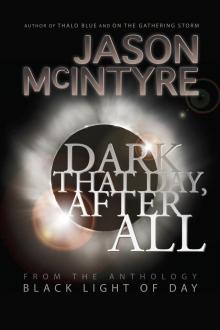 Dark That Day, After All
Dark That Day, After All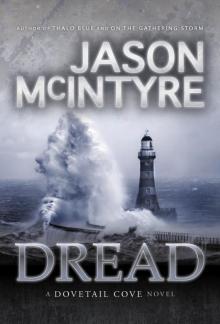 Dread
Dread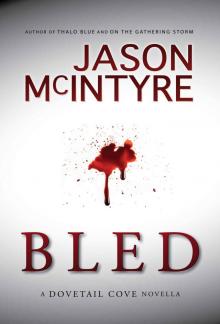 Bled
Bled Instead
Instead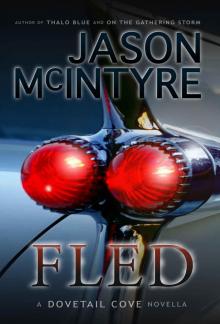 Fled
Fled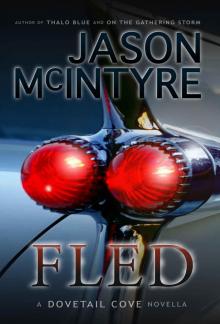 Fled (Dovetail Cove, 1973) (Dovetail Cove Series)
Fled (Dovetail Cove, 1973) (Dovetail Cove Series) Zed
Zed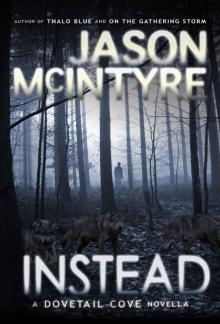 Instead (Dovetail Cove, 1979) (Dovetail Cove Series)
Instead (Dovetail Cove, 1979) (Dovetail Cove Series)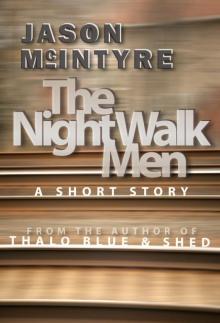 The Night Walk Men
The Night Walk Men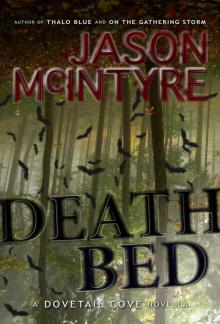 Deathbed (Dovetail Cove, 1971) (Dovetail Cove Series)
Deathbed (Dovetail Cove, 1971) (Dovetail Cove Series)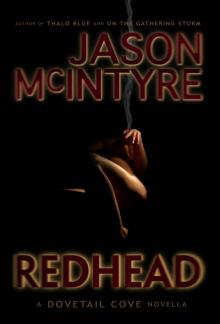 Redhead (Dovetail Cove, 1974) (Dovetail Cove Series)
Redhead (Dovetail Cove, 1974) (Dovetail Cove Series)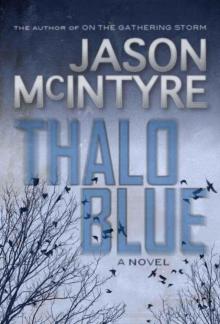 Thalo Blue
Thalo Blue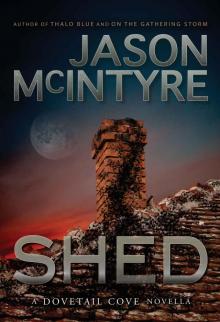 Shed
Shed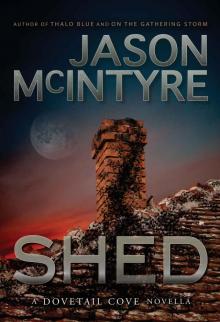 Shed (Dovetail Cove, 1977) (Dovetail Cove Series)
Shed (Dovetail Cove, 1977) (Dovetail Cove Series)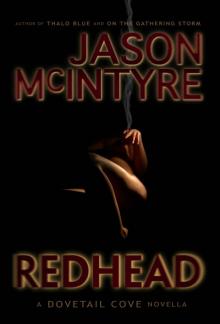 Redhead
Redhead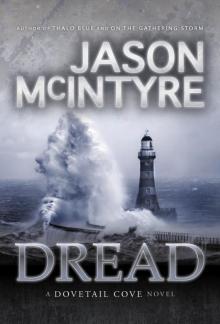 Dread (Dovetail Cove, 1978) (Dovetail Cove Series)
Dread (Dovetail Cove, 1978) (Dovetail Cove Series) Zed (Dovetail Cove, 1975) (Dovetail Cove Series)
Zed (Dovetail Cove, 1975) (Dovetail Cove Series)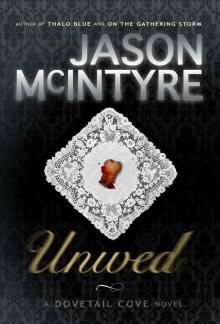 Unwed (Dovetail Cove, 1976) (Dovetail Cove Series)
Unwed (Dovetail Cove, 1976) (Dovetail Cove Series)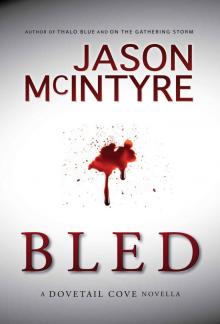 Bled (Dovetail Cove, 1972) (Dovetail Cove Series)
Bled (Dovetail Cove, 1972) (Dovetail Cove Series)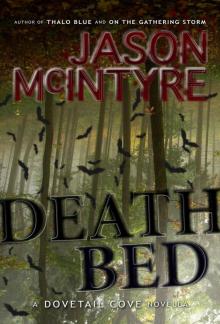 Deathbed
Deathbed